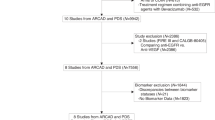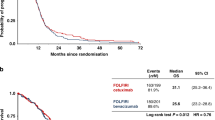Abstract
The CORRECT trial demonstrated survival benefits with regorafenib monotherapy in patients with treatment-refractory, metastatic colorectal cancer (mCRC). However, the trial’s stringent eligibility criteria for regorafenib may limit its external validity. We aimed to examine treatment attrition rates and eligibility for regorafenib in routine practice. We identified patients at the British Columbia Cancer Agency diagnosed with mCRC who demonstrated disease progression or intolerable toxicity on 2 or more lines of systemic therapy. During the study timeframe, panitumumab and cetuximab were only used in the chemo-refractory setting. Data on clinicopathologic variables and patient outcomes were ascertained and analyzed. Eligibility was determined using the CORRECT trial criteria. A total of 391 patients were identified, among whom only 39% were eligible for regorafenib: 35% in the panitumumab group and 51% in the cetuximab group. The main reasons for ineligibility in all patients were Eastern Cooperative Oncology Group Performance Status (ECOG PS) > 1 (69%), an elevated total bilirubin (21%), and thromboembolic events in the past 6 months (10%). No difference in eligibility for regorafenib was observed between patients previously receiving panitumumab or cetuximab (P = 0.914; 95% CI 0.550–1.951). Kaplan–Meier analyses showed that regorafenib-eligible compared to regorafenib-ineligible patients had an increased median overall survival of 5.3 versus 2.1 months, respectively (P < 0.001). However, Cox proportional hazard analyses showed that only ECOG PS rather than trial eligibility was correlated with outcomes. The strict eligibility criteria disqualify most patients with treatment-refractory mCRC for regorafenib therapy. Future trials should broaden the eligibility criteria to improve external validity.


Similar content being viewed by others
References
Ferlay J, Soerjomataram I, Dikshit R, Eser S, Mathers C, Rebelo M, Parkin DM, Forman D, Bray F. Cancer incidence and mortality worldwide: sources, methods and major patterns in GLOBOCAN 2012. Int J Cancer. 2015;136(5):E359–86.
Arnold M, Sierra MS, Laversanne M, Soerjomataram I, Jemal A, Bray F. Global patterns and trends in colorectal cancer incidence and mortality. Gut. 2016;66:683–691.
Howlader N, Noone AM, Krapcho M, Miller D, Bishop K, Kosary CL, Yu M, Ruhl J, Tatalovich Z, Mariotto A, Lewis DR, Chen HS, Feuer EJ, Cronin KA, editors. SEER cancer statistics review, 1975–2014, National Cancer Institute, Bethesda; 2014.
Wolpin BM, Mayer RJ. Systemic treatment of colorectal cancer. Gastroenterology. 2008;134(5):1296–310.
Amado RG, Wolf M, Peeters M, Van Cutsem E, Siena S, Freeman DJ, Juan T, Sikorski R, Suggs S, Radinsky R, Patterson SD. Wild-type KRAS is required for panitumumab efficacy in patients with metastatic colorectal cancer. J Clin Oncol. 2008;26(10):1626–34.
Karapetis CS, Khambata-Ford S, Jonker DJ, O’callaghan CJ, Tu D, Tebbutt NC, Simes RJ, Chalchal H, Shapiro JD, Robitaille S, Price TJ. K-ras mutations and benefit from cetuximab in advanced colorectal cancer. N Engl J Med. 2008;359(17):1757–65.
Price TJ, Peeters M, Kim TW, Li J, Cascinu S, Ruff P, Suresh AS, Thomas A, Tjulandin S, Zhang K, Murugappan S. Panitumumab versus cetuximab in patients with chemotherapy-refractory wild-type KRAS exon 2 metastatic colorectal cancer (ASPECCT): a randomised, multicentre, open-label, non-inferiority phase 3 study. Lancet Oncol. 2014;15(6):569–79.
Fakih M, Vincent M. Adverse events associated with anti-EGFR therapies for the treatment of metastatic colorectal cancer. Curr Oncol. 2010;17(Suppl 1):18.
Kennecke HF, Chen L, Blanke CD, Cheung WY, Schaff K, Speers C. Panitumumab (Pmab) versus cetuximab (Cmab)/irinotecan (Iri) therapy among patients with KRAS wild-type (wt) metastatic colorectal cancer (MCRC). J Clin Oncol. 2012;30:640.
Pettigrew M, Kavan P, Surprenant L, Lim HJ. Comparative net cost impact of the utilization of panitumumab versus cetuximab for the treatment of patients with metastatic colorectal cancer in Canada. J Med Econ. 2016;19(2):145–57.
Graham CN, Maglinte GA, Schwartzberg LS, Price TJ, Knox HN, Hechmati G, Hjelmgren J, Barber B, Fakih MG. Economic analysis of panitumumab compared with cetuximab in patients with wild-type KRAS metastatic colorectal cancer that progressed after standard chemotherapy. Clin Ther. 2016;30(6):1376–91.
Grothey A, Van Cutsem E, Sobrero A, Siena S, Falcone A, Ychou M, Humblet Y, Bouché O, Mineur L, Barone C, Adenis A. Regorafenib monotherapy for previously treated metastatic colorectal cancer (CORRECT): an international, multicentre, randomised, placebo-controlled, phase 3 trial. The Lancet. 2013;381(9863):303–12.
Wilhelm SM, Dumas J, Adnane L, Lynch M, Carter CA, Schütz G, Thierauch KH, Zopf D. Regorafenib (BAY 73-4506): a new oral multikinase inhibitor of angiogenic, stromal and oncogenic receptor tyrosine kinases with potent preclinical antitumor activity. Int J Cancer. 2011;129(1):245–55.
Rothwell PM. Factors that can affect the external validity of randomised controlled trials. PLOS Clin Trial. 2006;19(1):e9.
Mason AR, Drummond MF. Public funding of new cancer drugs: is NICE getting nastier?. Eur J Cancer. 2009;45(7):1188–92.
Sørensen JB, Klee M, Palshof T, Hansen HH. Performance status assessment in cancer patients. An inter-observer variability study. Br J Cancer. 1993;67(4):773–5.
Funding
The research was supported financially by the Mach-Gaensslen Foundation of Canada.
Author information
Authors and Affiliations
Corresponding author
Ethics declarations
Conflict of interest
The authors have no conflicts of interest to declare.
Ethics approval
Ethics approval was obtained from the BCCA Research Ethics Board. Being a retrospective study, formal consent is not required. This article does not contain any studies with animals performed by any of the authors.
Rights and permissions
About this article
Cite this article
Angeles, A., Hung, W. & Cheung, W.Y. Eligibility of real-world patients with chemo-refractory, K-RAS wild-type, metastatic colorectal cancer for palliative intent regorafenib monotherapy. Med Oncol 35, 114 (2018). https://doi.org/10.1007/s12032-018-1176-6
Received:
Accepted:
Published:
DOI: https://doi.org/10.1007/s12032-018-1176-6




